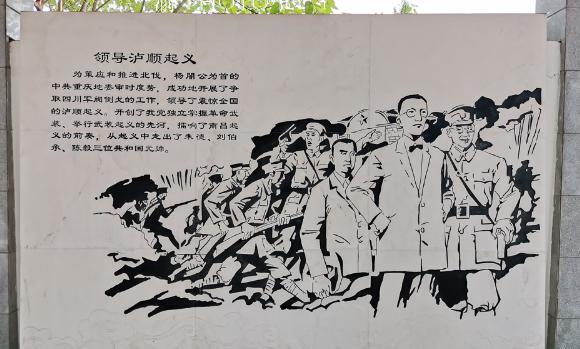Many uprisings broke out in the early days of the revolution, among which the Lushun uprising had a special significance, it was a major armed action to overthrow the warlords, it was a prelude to the armed uprising, and it was also the foreshadowing of the Nanchang uprising. Although the uprising ended in failure, it left the party with valuable experience and could be described as a brave attempt. The main leader of the uprising was Yang Mingong, an authentic Chongqing native. He made an indelible contribution to the cause of the revolution, cultivating many excellent generals, while he himself died young and fell under the torture of the enemy.

In the Lushun uprising, in addition to Yang Mingong, there were three other leaders, namely Liu Bocheng, Zhu De, and Chen Yi, all of whom were his subordinates and future founding marshals. It can be seen from this that Yang Mingong's seniority is so deep, if he had not been captured and killed by the enemy, I believe there would have been greater achievements. In addition, Yang Mingong's family is also an excellent party member cadre, and he is a well-known figure in the military and political circles. His younger brother Yang Baibing was awarded the rank of general, and his other younger brother, Yang Shangkun, was the future president of the country.
The Yang family is a large family in Chongqing, and with the support of their father, their children have received a very good education. Both of Yang Mingong's older brothers were advanced intellectuals and members of the League. Growing up in such an environment, Yang Mingong naturally embarked on the road of saving the country and the people, he went to Japan to study at the age of 19, and after returning, he began to participate in the revolutionary movement. He had a unique vision of the future of the revolutionary state, so he attracted many outstanding talents to join, and under the same patriotic concept, this group of people together became the reserve force of the party.
Yang Mingong attaches great importance to the cultivation of outstanding talents, and once he finds those capable patriots, he will take the initiative to communicate and bring them under the banner of communism. In 1923, the earliest communist group in Sichuan was formed, when Yang Mingong gathered a large number of intellectuals in Sichuan, but this did not include Liu Bocheng. Although the two were good friends who talked about everything, Liu Bocheng at that time did not realize the importance of the Communist Party to China's future. After this, Yang Mingong devoted himself to the building of the revolutionary contingent, and he recorded his experience of finding and establishing organizations. After Liu Bocheng saw it, he was greatly touched and had a deeper idea of the Communist Party. Three years later, Liu Bocheng finally had ideological consciousness and became a glorious party member under the introduction of Yang Mingong and others.
At the age of 27, Yang Mingong became the secretary of the Sichuan local executive committee, a position equivalent to that of the secretary of the Sichuan provincial party committee. Although he was young, he had a high prestige within the party and carried out the revolutionary movement in Sichuan in full swing. Liu Bocheng also opened a new life under the leadership of his friends and worked hard for the future of the motherland. In order to attract more promising young people, Yang Mingong often went to schools and factories to give speeches, in addition to which he founded several newspapers to promote Marxist ideas. Under his efforts, in just a few months, the number of party members in Sichuan has grown from a few dozen to several hundred, and multiple branches have been established.
Later, in order to cooperate with the advance of the revolution, Yang Mingong and others led the Lushun uprising, and more than 7,000 rebel troops ignited the fuse of the revolutionary uprising with enthusiasm. However, due to the lack of support from regular troops, coupled with Chiang Kai-shek's military suppression, it eventually ended in failure. Yang Mingong was unfortunately arrested during a transfer, underwent brutal torture, still did not divulge a single word about the Communist Party, and eventually died under the torture of the enemy.
The fact that such a great revolutionary died early is indeed a great regret in the history of the revolution. The deeds of Yang Mingong have been passed down to this day, he is our hero, the first batch of people who have awakened their consciousness. He has always adhered to the communist faith, has a fearless revolutionary spirit, and is a heroic and exemplary figure who contributed to the founding of New China.